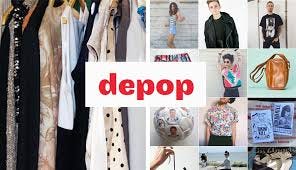This article was originally published by Christopher Appello, for CLLCTVE, on The Medium. Click here to view the original article.

It’s no question that the ongoing coronavirus pandemic has drastically limited employment opportunities in America, especially for recent college graduates. Businesses are laying off workers left and right; the unemployment rate is nearly 11 percent and the professional plans that many young prospective employees once had have been halted indefinitely. During this time of economic strife; however, Gen Z targeted brands are lending a platform for this age demographic to build small businesses of their own.
With a network of nearly 20 million users, the London startup Depop, founded by Simon Beckerman in 2011, is redefining the model ways in which one can make a living. With a download of the platform’s app, users become clothing vendors in a matter of seconds, uploading images of their own clothing to their profiles for other users to purchase. Depop vendors even have the option to leave their sold items on their profiles, creating a unique fashion collection that, in time, has the potential to amass hundreds of followers.

“While I never really care about my number of followers, it definitely takes a while to build them,” says Kate Regan, a Syracuse University Depop ambassador and rising senior who has been uploading her clothing on the platform for more than five years now — and she has achieved much success in doing so.
Regan admits that she always struggled to find employment even before the coronavirus outbreak, making her Depop profile at the young age of 16 when she had her first sales on the app. On Depop, Regan takes on the role of momjeans25, her profile name, which has amassed over 1,500 followers.
“One feature they have which is super cool is you can see how many items you have sold at the top of your profile, which for me is 535,” adds Regan, having made thousands of dollars since the start of it all.

“I definitely think it has allowed me to feel more independent. When I sell something by myself, I feel so accomplished and satisfied,” says Regan, one among the many members in the platform’s innovative community of young entrepreneurs.
Establishing a mutually beneficial relationship between itself and its users, Depop takes a 10 percent cut of all digital sales while giving other creatives the opportunity to make money of their own. Moreover, creatives can even avoid paying Depop’s fee by meeting with buyers in person. Ultimately, the company values its active buyers and sellers as they maintain constant dialogue with the platform’s community members, composed of 15 million+ stylists, designers, collectors, vintage sellers, sneakerheads and more.
Besides having this remarkable network of digitally native creatives that value ambition and authenticity, Depop prides itself on being a sustainable force in the current fashion industry.
“I believe they generally want to help the horrible construct that is fast fashion,” says Regan in regards to the company’s main objective of repurposing overlooked clothing into fashionable streetwear. While fast fashion brands like Forever 21 and H&M continue to produce their products unsustainably, and in turn, devastate the environment, Depop commits itself to a generation that adores turning novelty, second-hand items into eye-catching gems. Consequently, Gen Z has dominated this digital space, where people like Kate Regan can not only utilize their creative assets while making an honest living but also feel valuable for the digital contributions they make in a community of sustainably-minded individuals.

As many schools plan to reopen for the Fall 2020 semester, finances are a major concern for many struggling college students. “This is my only way to make money,” says Regan, who will continue rummaging through her closet for hidden gems to sell as a means of income amidst these uncertain times.
Be sure to sign up to join CLLCTVE’s waitlist + receive exclusive updates about our platform’s launch.